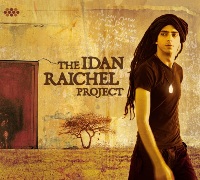The Culture Club
Permanent link All Posts

Growing up in Kfar Saba, Israel, Idan Raichel was attracted to music at a young age. After serving in the Israeli army, he worked as a counselor at a boarding school for immigrants and troubled youth. The school was home to many young Ethiopian Jews who introduced Raichel to Ethiopian folk and pop music. He began frequenting Ethiopian bars in Tel Aviv and soon set out to celebrate his appreciation for different cultures through his music.
Raichel gathered about 70 of his friends from Israel’s music scene to participate in his recordings and make a demo album. While the demo was considered “too ethnic” by some Israeli labels, the group was soon signed and went on to form The Idan Raichel Project—a collaboration between artists whose ages, native languages, ethnicities and level of musical participation varied widely. Raichel is the keyboardist, composer, producer and occasional vocalist of the Project, whose main participants include musicians of Ethiopian, Palestinian, Yemenite, South African and Surinamese descent.
The Idan Raichel Project’s first album went triple platinum in Israel in 2002, and their sophomore release in 2005 went double platinum. The group has performed widely throughout the United States, Israel, Spain, Germany, India and Australia.
The Idan Raichel Project is coming to Chicago in celebration of Israel Solidarity Day, Sunday, May 4, at McCormick Place. Oy!Chicago caught up with Raichel before the big show.
Oy!: How did your musical career begin?
Idan Raichel: I’ve been doing music since I was young. I started out playing the accordion and then I served in the Israeli army as a musician for three years. I performed almost every day for Israeli soldiers. That became a huge experience—doing live shows and playing for a lot of people.
You’ve widely said that you have “no roots.” What do you mean by that and how do you think that has influenced your music?
I was born in Israel and I’m a native Israeli. But in Israel, even after 60 years, you cannot define its food or its culture as one thing because it is all mixed. I have a grandfather from Russia, and if I followed classic Eastern European culture, I would be eating borscht. But I have no roots, and once you don’t have roots, you can feel free to explore many cultures with the curiosity of an outsider. I can take a native Ethiopian sound and mix it with electronic music influenced by Euro pop because no one is labeling me by my background.
Most of your songs are in Hebrew, Amharic and Arabic. How is your music is received in parts of the world unfamiliar with those languages?
People outside of Israel define our music as world music. To us, it’s Israeli. But people, when they are coming to see us, they’re not expecting us to sing in English or for us to translate our songs. We sing them as they are. They are interested in listening to this music as it is.
To what can you attribute the diverse sound of the Project?
When you look at the Project, it’s about all these people mixed together. Most of them—about 90%—are Israeli by definition, but they immigrated from Ethiopia and South America and all over. The youngest is 16 and the eldest is 83. They know that they can give their own input. There can be someone who is with the Project for years but never sings, and then there is a song they feel they can give their own input into. Sometimes we have people who used to sing their own prayers—very traditional prayers—that they passed along and were so open-minded to have them mixed in with mainstream music. I think it’s beautiful to think about Israel in 2008 with those prayers updated and made contemporary.



.jpg)



